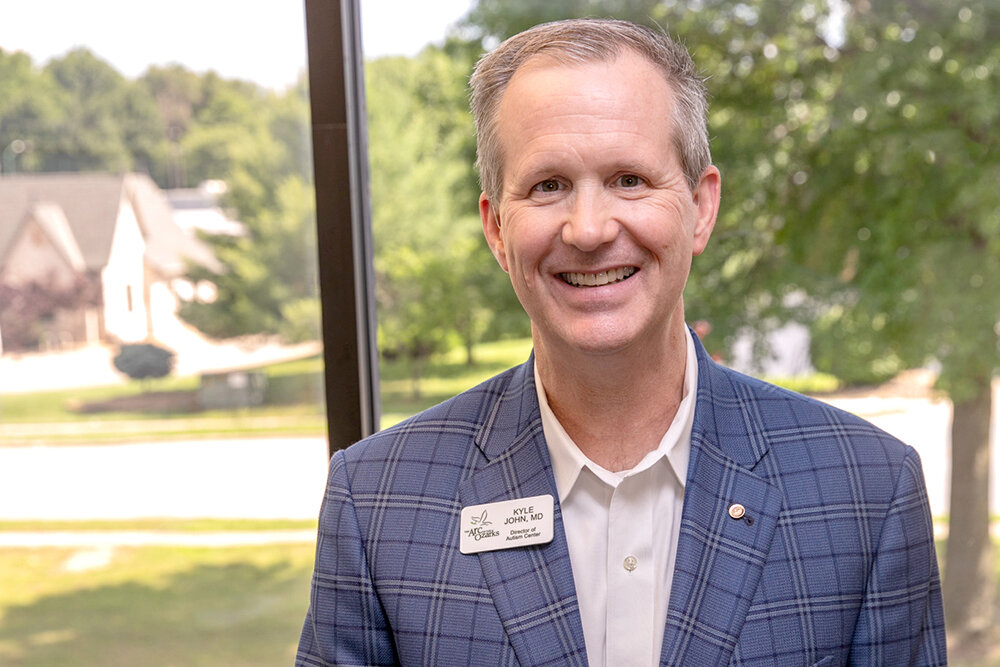YOUR BUSINESS AUTHORITY
Springfield, MO
YOUR BUSINESS AUTHORITY
Springfield, MO

You were hired this spring to lead the Arc’s autism center. I understand that will be the first autism center of its kind in Springfield. What services will it offer and what need will it fill?
There are currently (six) official state autism centers in Missouri. In this part of the state, there’s nothing. That doesn’t mean there aren’t people doing autism diagnosis and treatment, but there’s nothing that is the same level as an official state-funded autism center. That’s our goal. I suspect that the formal process could take another year. We have had, for close to 10 years, a relationship between the Arc of the Ozarks, Mercy [Springfield Communities] and Missouri State [University], and that started when we realized we don’t have a diagnostic team. We started doing a very small diagnostic program. We were lucky if we were getting four to six a month. The Arc got very intentional about saying we need to have a bigger clinic in Springfield. That’s when they went to the state legislators. Of the three entities, the Arc is really the guiding member, but together with Mercy and Missouri State, we’ve received funding. If we can raise $5 million, the state will match it. That $10 million then will go to build the facility, hire the staff and begin the program. Our goal will be to do 400 to 500 diagnostic processes a year. We’re also going to provide psychiatric care. Other medical specialties, we’ll partner with Mercy and bring those services into the clinic as needed. Missouri State’s contribution will be to bring students in and let them get the experience of how we diagnose and treat patients with autism so that we’re training the evaluators and treaters of the future for our region. And Missouri State also brings a research entity.
Autism rates in children have grown significantly in the last 20-plus years to 1 in 36 kids from 1 in 150, per the Centers for Disease Control and Prevention. What’s behind that?
Over that 20-year span, we’ve looked at autism a little bit differently. The criteria have gotten a little bit broader and have been adjusted, but also our ability to recognize and diagnose it has gotten a lot better. It was probably always more prevalent than what we recorded way back when. We’re screening earlier. We’ve got therapies that can start for kids as young as one year old. We’ve got sophistication among our pediatricians and family physicians that are screening kids at regular developmental levels and referring those kids much earlier. And we’ve got more sophisticated tests and processes to diagnose kids. Receiving the diagnosis early is critical because it’s a developmental disability. The sooner you receive the diagnosis and get enrolled and engaged in therapies, the better the long-term outcome. It really behooves us, not just as professionals, but as taxpayers to help identify these folks early and intervene early. There is a price tag that you can attach to somebody who doesn’t get diagnosed until later in life. That’s into the millions of dollars.
Why has there been such a void in these services?
We don’t have enough providers especially trained in neurodevelopmental disorders. We don’t have any developmental pediatricians in Springfield, and we probably never will. Wherever our patients get care, we want to be a good partner with those folks, recognizing that our patients need good primary care across the lifespan, but there’s not enough of those folks that feel comfortable doing that work. There’s a generally accepted best practice for how you make a diagnosis of autism, so getting enough people trained to do that and really outside of big cities, it’s just so uncommon. Now let’s say you’re trained. The specialties that you need to include in the diagnostic team and the time that it takes to make a diagnosis, I think the average is about $1,200 per client. Who’s going to do that unless you have a grant or you’re receiving state funding? And that’s exactly what happens at those certified state autism centers. They receive state funding basically to offset the cost of the diagnosis. We’ll be swimming upstream trying to catch up and get enough trained providers. We are definitely in a growth mode.
At the end of last year, the Arc had raised about $2 million of the $5 million match. Where are you now, and what is the timeline to open the center?
The Arc made the initial investment. We said we’ll take $2 million of our own dollars and we found a location on Nettleton [Avenue] in Springfield. They started rehab on that last week. We’ve been thoughtful about how do we make our building especially welcoming and physically appropriate for our patients. For our capital campaign, we are in the process of identifying our co-chairs. We will have naming opportunities and we have some early conversations ongoing with some potential donors. We’re shooting for the end of the year, beginning of January to be in the new facility. I suspect if you call the Thompson Center [for Autism and Neurodevelopment in Columbia] today and say, “How long’s the wait?” be prepared to hear one to two years. That’s crazy for this diagnosis because that’s one to two years of development lost of working with that child on the skills that they need to be successful. You shouldn’t have to wait more than six weeks to get in and get evaluated. Time is so critical for these kids. It’s a privilege to get to do this. It’s an unmet need.
Moseley’s Discount Office Products was purchased; Side Chick opened in Branson; and the Springfield franchise store of NoBaked Cookie Dough changed ownership.